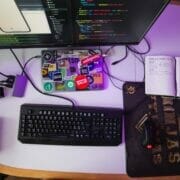Best Programming Languages For App Development — Our Top 10 List
Every developer wants to know what the best programming languages are for a number of reasons. Firstly, it’s always interesting learning about the languages that rank high on GitHub, Stack Overflow, and TIOBE Index. Secondly, high adoption rates of a particular language impact how easy it’s to find and hire skilled developers. And thirdly, knowing which languages are most suitable for specific market segments, helps us make better decisions.
Below, we’ve compiled a handy list that pinpoints the best-in-class programming languages for app development. A few of these choices may surprise you, but we laser-focused on the languages that are the most useful and relevant.
1. Kotlin
In 2017, Google announced that Kotlin would become a first-class citizen for developing Android apps. And during these past five years, Kotlin has become the preferred language for Android mobile app development. But what does this mean for Java — is it still relevant? Yes, many developers still use Java, and it’s still possible to develop Android apps using this language.
However, Kotlin is modern and offers several time-saving features that help developers be more productive. And coupled with Google’s Jetpack libraries and easy-to-implement Kotlin APIs, there’s never been a better time to develop for Android.
Given the popularity of Android on a global scale and its proliferation on a wide range of devices, it’s a platform that no app developer can ignore. Therefore, if there’s one programming language that will open many doors, it’s Kotlin. And that’s why Kotlin is in our number one spot in our epic list of best programming languages for app development!
2. Swift
Similar to how Google is replacing Java with Kotlin, Apple has a similar strategy. The company is heavily promoting Swift as its flagship programming language, even though it’s possible to develop for iOS using Objective-C. And that’s a good thing, as Objective-C is a dated language that not every programmer enjoys using.
What Swift brings to the table is a cleaner and simpler syntax, which allows developers to enjoy substantial productivity gains. Therefore, if you were to start developing for iOS today, you’re better off choosing Swift over Objective-C. Not only will you complete your projects faster, but your code will be more readable and maintainable.
Another advantage of Swift is that it’s native to iOS, which means it’s more performant than third-party languages. Generally, always opt for a programming language native to the target platform unless this isn’t financially feasible or there isn’t anyone on your team that’s skilled in the language.
3. C#
Microsoft may not have made a significant impact in the mobile space. After all, they failed to respond quickly to the rise of smartphones, and their Windows Phone failed miserably. But where Microsoft does shine is in their development tools and releasing the powerful and versatile programming language — C# (pronounced C Sharp and not C Hash).
Designed by Anders Hejlsberg — the author of Turbo Pascal and lead architect of Delphi — C# closely resembles Java but has more quality of life features. And similar to C++ and Java, it’s also an object-oriented programming (OOP) language, ideally suited for business applications and games.
C# programmers that want to develop for Android and iOS can do so with the Xamarin framework. And it’s possible to achieve near-native performance on both platforms, as long as these programmers are skilled at taming the rather complex .NET garbage collector (GC). Mobile game developers can also use C# together with Unity to create stunning-looking 3D games.
4. C++
C++ is one of those languages many developers prefer to avoid using whenever possible. And that’s because it’s incredibly complex and hard to master. However, C++ is the lingua franca of the game development world. So, if you’re developing a game engine or using Unreal Engine for your next mobile game, you’ll need to know C++.
And while Unreal Engine has the Blueprints Visual Scripting language, it has a steep learning curve and doesn’t offer the same level of performance as C++. But it doesn’t end there; Google recently released the Android Game Development Kit (AGDK), which allows developers to code in C++ while taking advantage of the Jetpack libraries.
Another area where knowing C++ comes in handy in dealing with application programming interfaces (APIs). You’ll find a large number of APIs written in C++, and these can range from networking to app monetization modules.
5. OpenGL ES Shading Language (GLSL)
OpenGL ES is a free-to-use cross-platform API owned by the Khronos Group. Also, it’s one of the most indispensable APIs any Android developer will use, as this handles 2D and 3D rendering. That’s why having sufficient know-how of GLSL not only comes in handy; it’s essential for any graphically intensive apps.
But what exactly is GLSL, and how does it work? GLSL is a programming language resembling C (a low-level language that precedes C++). Furthermore, GLSL commands will execute on the graphics processing unit (GPU) instead of the central processing unit (CPU).
6. Metal Shading Language (MSL)
Not to be outdone by its rivals, Apple has created a proprietary API for hardware-accelerated graphics for its platforms. Known as Metal, this API only works on Apple’s devices, unlike the OpenGL standard, which is cross-platform. But it’s possible to cross-compile GLSL to Apple’s MSL standard via the SPIR-V transpiler.
MSL allows Apple developers to achieve similar results to what their Android counterparts can do with GLSL. And thanks to the Metal-cpp interface, C++ programmers can easily code for Metal or port apps and games from other platforms. Developers accustomed to Microsoft’s DirectX API and High-Level Shader Language (HLSL) shouldn’t find it difficult to adopt or transition to MSL.
7. Java
Java is a language that remains useful for Android and enterprise developers. And knowing the ins and outs of Java is still helpful for those getting to grips with Kotlin and even C#. Furthermore, developers may need to maintain existing Java apps or port these over to a more modern language, such as Kotlin.
And surprisingly, Java is a decent language for mobile app development coupled with a good framework. The open-source libGDX game development framework is lightweight and versatile, making it relatively easy to develop 2D and 3D cross-platform games. However, libGDX also works with Kotlin, which is likely the better choice for newer projects overall.
8. Structured Query Language (SQL)
Now, SQL may not seem like the most interesting of languages. And some may think that it should never have made it to our best programming languages list. However, if your app uses a database extensively — and most do — then knowing SQL makes sense.
The language is powerful and versatile enough to handle large amounts of data and complex queries. But it should be coupled with the framework that best suits your needs. And that’s the tricky part, as there are many flavors of SQL and NoSQL (not only SQL) databases out there, such as Amazon DynamoDB, Cassandra, MySQL, PostgreSQL, and SQLite, to name a few.
9. JavaScript
Over 16 million developers use JavaScript, which often ranks as one of the world’s most popular programming languages. So why does it rank so low here? Well, JavaScript is a web-based language designed primarily for client-side web pages and never meant for mobile apps.
But that doesn’t mean you can’t use JavaScript, as long as you don’t mind creating a hybrid app instead of a native one. You’ll need to use a framework such as React Native or Ionic Framework. And while these frameworks promise amazing results, it’s unlikely they can perform as well as native apps developed by professional studios such as NS804.
10. Python
Many newbie developers and script kiddies probably consider Python one of the best programming languages for app development. And there’s no shortage of YouTube tutorial channels that have generated much hype for Python. But it’s not the be-all and end-all of programming languages, not even close.
Unfortunately, the fanboyism surrounding Python may cause some developers to opt for this language instead of more appropriate alternatives. And while often touted for its machine learning (ML) capabilities and ease of use, Python seldom matches the performance, look, and feel of native apps made with Kotlin and Swift.
But it’s not all bad, as Python is still a good choice for creating prototypes and minimum viable products (MVPs). And it’s possible to complete smaller projects using frameworks such as BeeWare or Kivy relatively quickly.
In Conclusion
Our top 10 list of best programming languages for app development was carefully considered. Mainstream popularity and hype didn’t affect our choices, as we focused exclusively on the languages that truly facilitate the app development process. And we placed languages native to a platform or offer near-native performance right at the top, and the least performant languages at the bottom.
Contact NS804 to learn how we’ll help you create native apps with the best-in-class programming languages and tools!













Leave a Reply
Want to join the discussion?Feel free to contribute!